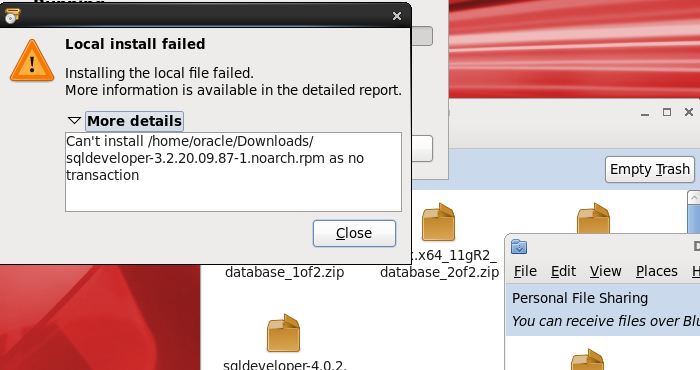Can't install /home/oracle/Downloads/sqldeveloper-3.2.20.09.87-1.noarch.rpm as no transaction
In preparation to installing Oracle sql developer to manage my identity management databases, I was unable to execute the program once installed on OEL 6.0. In installed SQLDeveloper 4.0, clicked on the icon, though nothing happens. When I navigated to the default default location of sqldeveloper (/opt/sqldeveloper) and executed the .sh script directly, it would then request for the location of the JDK.
I then realized that SQL Developer requires JDK 7, which I was not willing to install because I wanted the same JDK version to be the same as my Identity Management installation. I ended up installing JDK 6u37

When I tried to install sqldeveloper-3.2.20.09.87-1.noarch.rpm, I would get the following error:
Can't install /home/oracle/Downloads/sqldeveloper-3.2.20.09.87-1.noarch.rpm as no transaction
Turns out that simply removing the newer version of SQL Developer was not enough. I was required to uninstall the rpm package of sql developer in order for me to install the older version.
HOW TO: uninstall SQL Developer on unix
The best way to uninstall sqldeveloper is to remove the directory from the /opt/ directory AND uninstall the rpm package by running the following command
rpm -qa | grep -i sql
Once you've located the package, execute the similar package command:
rpm -e sqldeveloper-4.0.2.15.21-1.noarch
About the author
 Daniel is a Technical Manager with over 10 years of consulting expertise in the Identity and Access Management space.
Daniel is a Technical Manager with over 10 years of consulting expertise in the Identity and Access Management space.Daniel has built from scratch this blog as well as technicalconfessions.com
Follow Daniel on twitter @nervouswiggles
Comments
Other Posts
AS I was migrating my environment into an S3 environment, I wanted to leverage off the SES services that AWS provide, more specifically, to leverage the off the SMTP functionality by sending an email via PHP
Read More...
The WeMos D1 is a ESP8266 WiFi based board is an extension to the current out-of-the-box library that comes with the Arduino installation. Because of this, you need to import in the libraries as well as acknowledging the specific board. This process is highly confusion with a number of different individuals talking about a number of different ways to integrate.
Read More...
NameID element must be present as part of the Subject in the Response message, please enable it in the IDP configuration.
Read More...
For what I see, there's not too many supportive documentations out there that will demonstrate how provision AD group membership with the ICF connector using OpenIDM. The use of the special ldapGroups attribute is not explained anywhere in the Integrators guides to to the date of this blog. This quick blog identifies the tasks required to provision AD group membership from OpenIDM to AD using the LDAP ICF connector. However this doesn't really explain what ldapGroups actually does and there's no real worked example of how to go from an Assignment to ldapGroups to an assigned group in AD. I wrote up a wiki article for my own reference: AD group memberships automatically to users This is just my view, others may disagree, but I think the implementation experience could be improved with some more documentation and a more detailed example here.
Read More...
In the past, the similar error occurred though for the Oracle Identity Management solution. invalidcredentialexception remote framework key is invalid Because they all share the ICF connector framework, the error/solution would be the same.
Read More...
org.forgerock.script.exception.ScriptCompilationException: missing ; before statement
Read More...
ForgeRock IDM - org.forgerock.script.exception.ScriptCompilationException: missing ; before statement
Read More...
When performing the attempt of a reconciliation from ForgeRock IDM to Active Directory, I would get the following error
Read More...
In the past, the similar error occurred though for the Oracle Identity Management solution. invalidcredentialexception remote framework key is invalid Because they all share the ICF connector framework, the error/solution would be the same.
Read More...
During the reconcilation from OpenIDM to the ICF google apps connector, the following error response would occur. ERROR Caused by com.google.api.client.auth.oauth2.TokenResponseException 400 Bad Request - invalid_grant
Read More...

